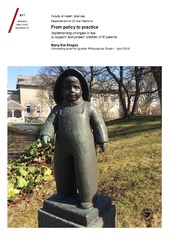From policy to practice: Implementation of changes in law to support and protect children of ill parents
Permanent lenke
https://hdl.handle.net/10037/17328Dato
2019-11-22Type
Doctoral thesisDoktorgradsavhandling
Forfatter
Skogøy, Bjørg EvaSammendrag
Children of parents with serious forms of illness have shown to be vulnerable to developing a wide variety of psychosocial problems themselves. The research literature strongly indicates that preventive interventions may protect against well-documented transgenerational risk factors and strengthen the children’s resilience by promoting protective factors. Despite this knowledge, there is a gap between what we know from research and the implementation of preventive efforts on a larger scale.
In 2010, Norway became one of the first countries to require by law that all health professionals play a part in the prevention of psychosocial problems in children of parents with all kinds of illnesses (mental illness, substance abuse, or severe physical illness or injury). This thesis contributes to the understanding of how these policy changes were received by some Norwegian hospitals and health professionals, and whether the changes in law were implemented as intended.
The first area of investigation, using Fixsen’s Active Implementation Framework, examined the extent to which the new law had been implemented as intended. The data consisted of a stratified, random sample of managers and child responsible personnel (N = 167) from five hospitals filling in an adapted version of the Implementation Components Questionnaire (ICQ) and the Implementation Satisfaction Scale (ISS) about the implementation of the policy changes. Additional information was collected from 21 hospital coordinators (H-CRP) from 16 other hospitals. The first study found important implementation differences between the five hospitals, with the lowest implementation scores from the smallest hospital. The conclusion was that the policy changes are helpful, but quality improvements are needed to secure equal support and protection for all children of ill parents.
The second area of investigation examined health professionals’ (N = 280) adherence to the new guidelines of family focused practice, using a translated and generic version of the Family Focused Mental Health Practice Questionnaire (FFPQ). The results showed that thehealth professionals scored high on knowledge and skills, and they were confident working with families and children, but reported moderate levels of family support and referrals. This indicated that the hospitals were still in an initial implementation stage of the policy changes. Significant differences were observed between the hospitals regarding workplace support, knowledge and skills, and family support. It was concluded that the differences in the implementation of family focused practice highlights the need to tailor improvement strategies to specific barriers at the different hospitals.
The third area of investigation examined differences in family focused practice between health professionals with different backgrounds and roles (N = 280) and explored predictors of family focused practice. The study identified clear differences in family focused practices between the different types of health professionals (nurses, social workers, physicians, and psychologists), and between health professionals appointed to the role of child responsible personnel compared to other clinicians. The conclusion was that hospitals must secure workplace support, time for family work and co-worker support/supervision, and collaborate with others to establish services that are available to families. Improvement strategies must be tailored to the different types of health professionals, with greater emphasis needed to encourage the family focus of physicians and psychologists.
Collectively, the findings of this thesis contribute to a better understanding of hospitals and the health professional’s role in the implementation of a new policy, law and guidelines. Leadership has a key role in securing resources needed to implement changes both to the inner context (organisation), and to collaborate with other context /systems (e.g. universities, municipalities, and non-governmental organisations) to develop the health professional’s 8 competency and to establish high-quality services for families and children. The thesis also contributes to the understanding that the health professional’s adherence to the new guidelines varies between the less complex practices (talking with parents about children’s needs) and the more complex practices (family support and referrals). Furthermore, the more complex a practice is that is to be implemented, the more important the organizational support will be. The health professional’s knowledge and skills are essential to achieve an actual practice change. However, it might be more challenging to have practitioners with a higher level of education (physicians and psychologist) comply with the new requirements. The thesis also contributes to the understanding that smaller organisations might have fewer resources to follow up on innovations (new ideas and practices) such as the policy changes. Further research should explore whether differences between types of practitioners and between hospitals are consistent over time. National health authorities should establish national quality indicators and consider strategies to better support the implementation process. Making use of implementation theories and improvement strategies could promote full (increased) implementation, where all families and children in need are identified and have access to family support.
Har del(er)
Paper 1: Skogøy, B.E., Sørgaard, K.S.O., Maybery, D., Ruud, T., Stavnes, K.A., Kufås, E., ... Ogden, T. (2018). Hospitals implementing changes in law to protect children of ill parents: A cross-sectional study. BMC Health Services Research, 18, 609. Also available in Munin at https://hdl.handle.net/10037/14976.
Paper 2: Skogøy, B.E., Maybery, D., Ruud, T., Sørgaard, K., Peck, G.C., Kufås, E., ... Ogden, T. (2018). Differences in implementation of family focused practice in hospitals: a cross-sectional study. International Journal of Mental Health Systems, 12(1), 77. Also available in Munin at https://hdl.handle.net/10037/14964.
Paper 3: Skogøy, B.E., Ogden, T., Weimand, B., Ruud, T., Sørgaard, K. & Maybery D. Predictors of family focused practice: organisation, profession, or the role as child responsible personnel? (Submitted manuscript). Published version in BMC Health Services Research, 19, 793 (2019), available in Munin at https://hdl.handle.net/10037/17083.
Forlag
UiT The Arctic University of NorwayUiT Norges arktiske universitet
Metadata
Vis full innførselSamlinger
Følgende lisensfil er knyttet til denne innførselen:


 English
English norsk
norsk
